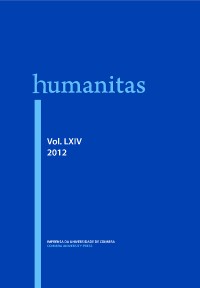Please use this identifier to cite or link to this item:
https://hdl.handle.net/10316.2/27381| DC Field | Value | Language |
|---|---|---|
| dc.contributor.author | Várzeas, Marta | - |
| dc.contributor.other | Faculdade de Letras da Universidade de Coimbra. Instituto de Estudos Clássicos (ed. lit.) | - |
| dc.date.accessioned | 2013-12-19T11:49:47Z | |
| dc.date.accessioned | 2020-10-02T17:03:12Z | - |
| dc.date.available | 2013-12-19T11:49:47Z | |
| dc.date.available | 2020-10-02T17:03:12Z | - |
| dc.date.issued | 2012 | - |
| dc.identifier.issn | 2183-1718 | - |
| dc.identifier.uri | https://hdl.handle.net/10316.2/27381 | - |
| dc.description.abstract | Na longa história daquilo a que Platão haveria de chamar ‘o antigo debate entre poesia e filosofia’, o problema central que enformou a polémica contra os poetas foi o da verdade. Este é, no universo poético de Píndaro, um conceito nuclear, pois o poeta assume a função profética de trazer à luz a essência espiritual da arete. Em Baquílides, porém, a verdade “é da mesma cidade dos deuses”, mas o poeta não parece tão confiante na possibilidade de aceder ao seu conhecimento. Em termos poéticos, o domínio em que se move é o da doxa, e daí o seu interesse pela acção humana concreta, sem a qual, em última análise, não existiria o canto. | por |
| dc.description.abstract | In the long history of what Plato would later call “the ancient debate between poetry and philosophy” truth was in the very centre of the polemic against poets. In Pindar’s poetic universe truth is a nuclear concept and the poet assumes his prophetic function of bringing to light the spiritual essence of arete. But in Bacchylides truth “is of the same city as the gods”, and the poet doesn’t seem so confident in the possibility of achieving true knowledge. His poetic domain is doxa’s, and that explains his interest for the concrete human action, for without it song wouldn’t even exist. | eng |
| dc.language.iso | por | - |
| dc.publisher | Imprensa da Universidade de Coimbra | - |
| dc.subject | Truth | eng |
| dc.subject | poetry | eng |
| dc.subject | Bacchylides | eng |
| dc.subject | Pindar | eng |
| dc.subject | epinikion | eng |
| dc.subject | Verdade | por |
| dc.subject | poesia | por |
| dc.subject | Baquílides | por |
| dc.subject | Píndaro | por |
| dc.subject | epinício | por |
| dc.title | “A mais bela brincadeira das musas": poesia e verdade em Baquíliades | por |
| dc.type | article | - |
| uc.publication.collection | Humanitas vol. LXIV | - |
| uc.publication.firstPage | 9 | - |
| uc.publication.lastPage | 19 | - |
| uc.publication.location | Coimbra | - |
| uc.publication.journalTitle | Humanitas | - |
| uc.publication.volume | 64 | por |
| dc.identifier.doi | 10.14195/2183-1718_64_1 | - |
| uc.publication.section | Artigos | - |
| uc.publication.orderno | 1 | - |
| uc.publication.area | Artes e Humanidades | - |
| uc.publication.manifest | https://dl.uc.pt/json/iiif/10316.2/27381/257847/manifest?manifest=/json/iiif/10316.2/27381/257847/manifest | - |
| uc.publication.thumbnail | https://dl.uc.pt/retrieve/12006816 | - |
| item.grantfulltext | open | - |
| item.fulltext | With Fulltext | - |
| Appears in Collections: | HVMANITAS | |
Files in This Item:
| File | Description | Size | Format | |
|---|---|---|---|---|
| humanitas64_artigo1.pdf | 391.96 kB | Adobe PDF |  |
Items in DSpace are protected by copyright, with all rights reserved, unless otherwise indicated.
